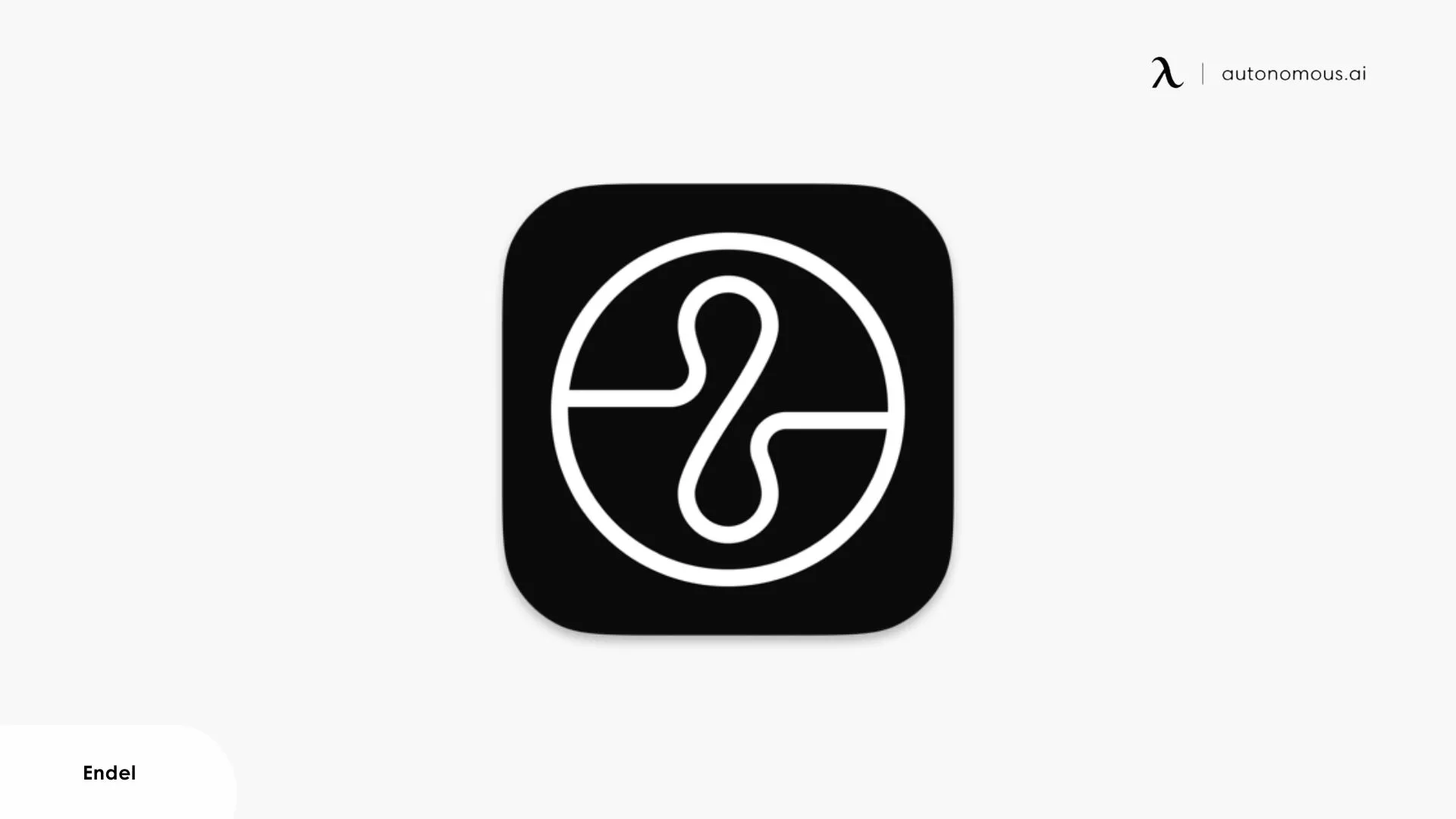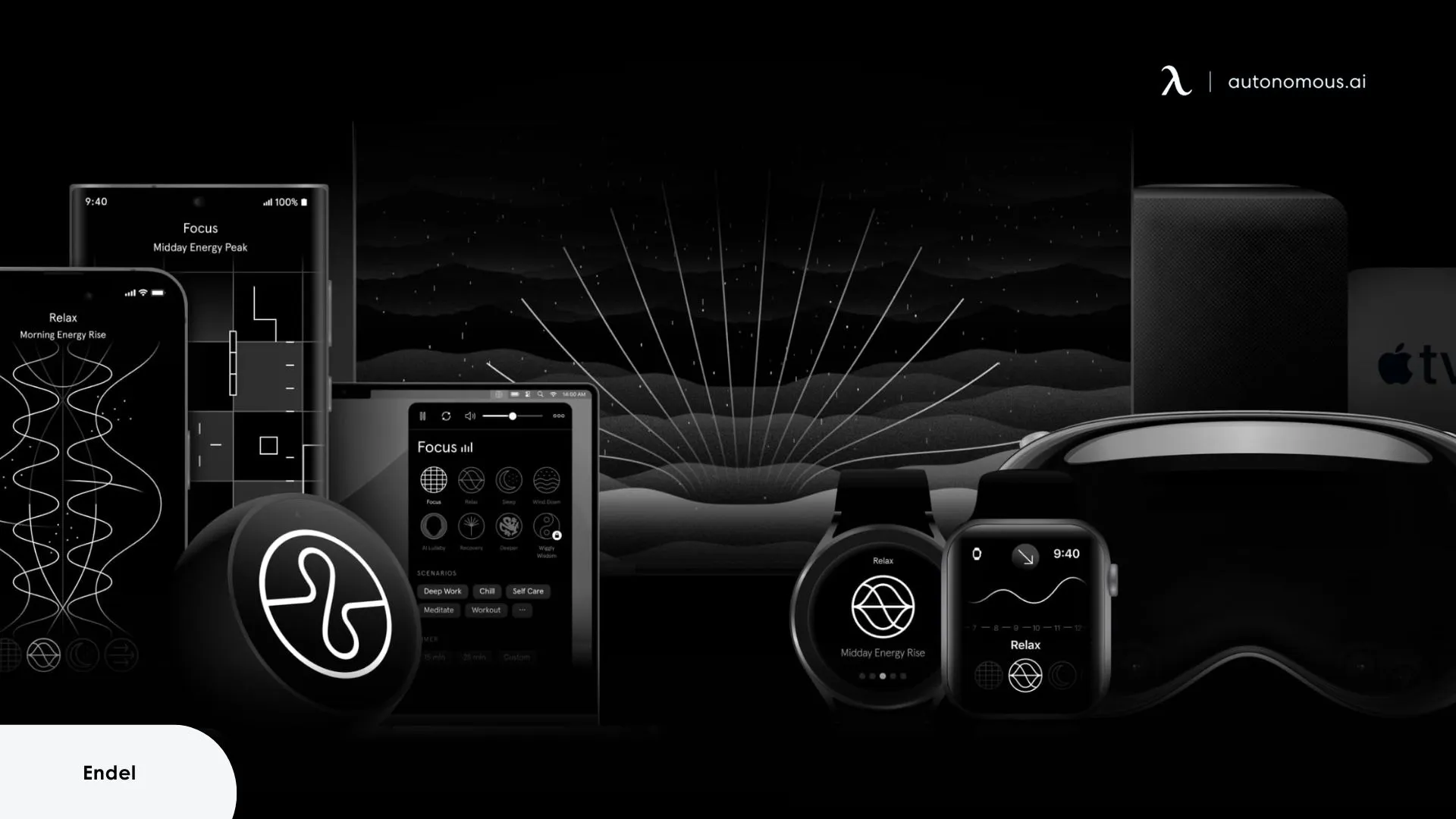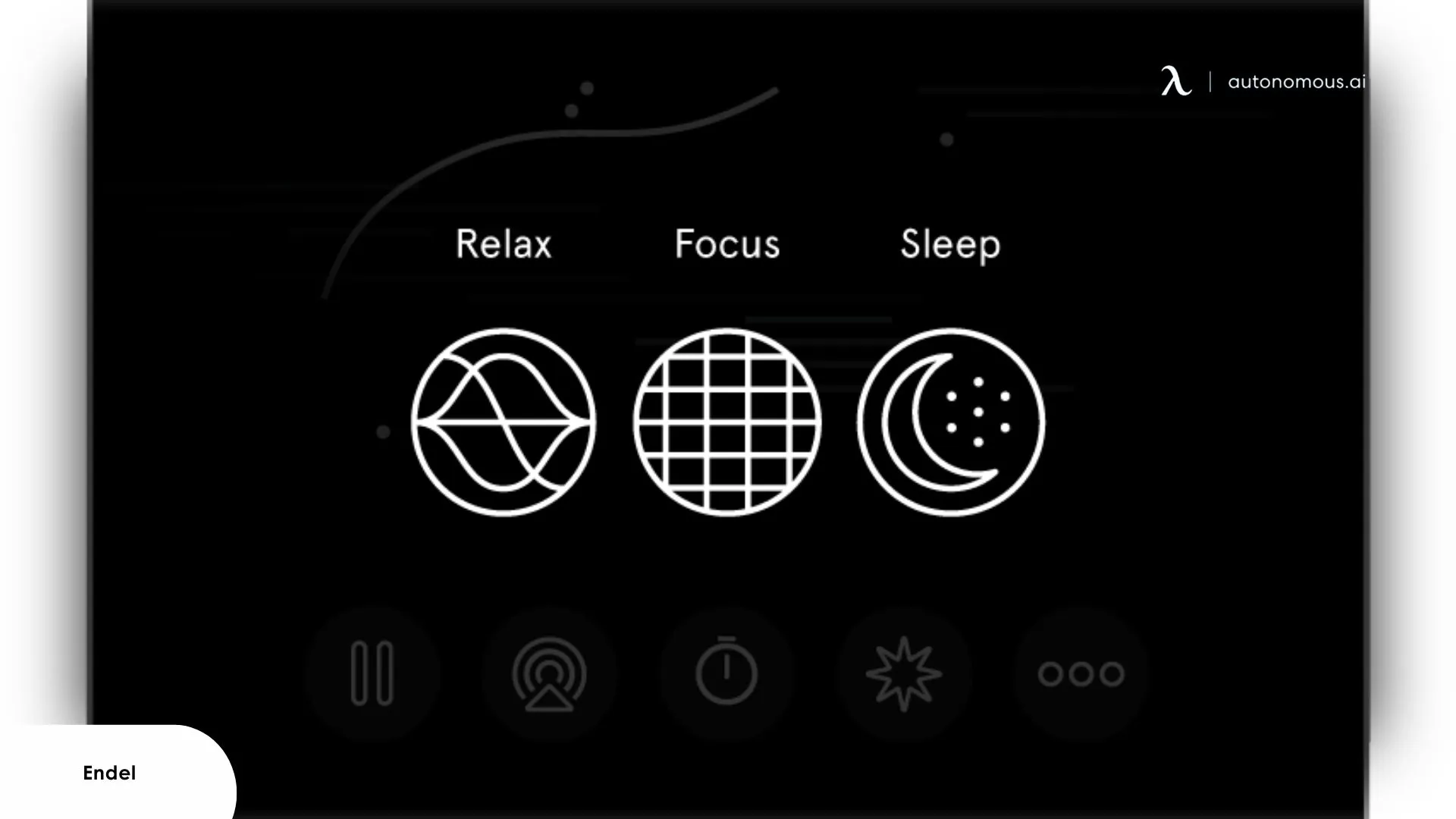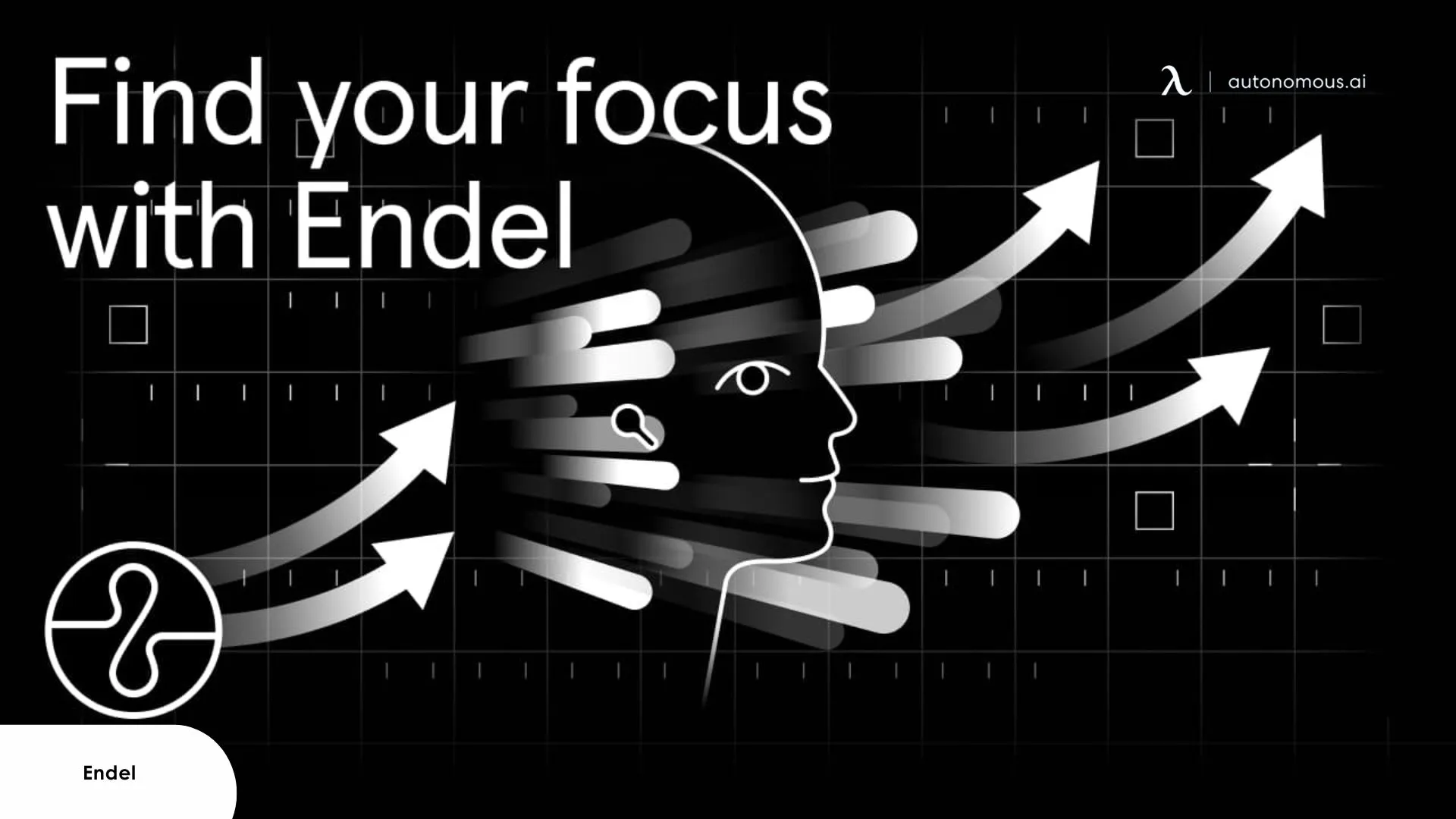.webp)
Endel App Review: Worth $60? My 3-Month Experience
Table of Contents
The Endel app has gained a lot of attention for its AI-powered soundscapes designed to help users focus, relax, and sleep more easily. Using data like time of day, activity, and even heart rate, it creates personalized audio experiences meant to match your mental and physical state.
With millions already using it, I wanted to see if it lived up to the hype. In this Endel app review, I’ll share how it actually performed, whether the Endel app cost feels fair, and if it’s better than other apps.
What Is The Endel App?
Endel is a sound-based wellness app built around one core idea: the right audio at the right time can help you work, rest, and recover more effectively. It uses a patented AI engine that combines factors like your location, local weather, time of day, and even biometric data such as heart rate to generate soundscapes in real time.
These soundscapes aren’t just static playlists — they shift and adapt as your inputs change, creating an audio environment that feels alive and responsive. The app offers several modes, each tuned for a specific purpose:
- Focus for deep, sustained concentration
- Relax to ease stress and calm the mind
- Sleep to guide you into and maintain restful sleep
- Recovery to help lower anxiety and restore balance
- Study for calm, alert mental energy during learning sessions
Its adaptive design can also support instant ADHD relief by quickly creating a sound environment that reduces sensory overload and minimizes distractions, helping you settle into a task more smoothly. This can be especially useful for adults managing different challenges at work, from common issues of ADHD affecting work to understanding the different types of ADHD in adulthood. While not a medical treatment, this feature makes it appealing for those who need fast, distraction-free focus.
Endel also collaborates with artists to create unique experiences, like “Deeper Focus” with electronic musician Plastikman, blending creative expression with functional audio. All modes can be used offline, making it easy to take these soundscapes anywhere — whether you’re working at your desk, commuting, or winding down for the night.

How Endel Works
Endel’s approach is more dynamic than simply pressing play on a playlist. When you open the app, it starts pulling in contextual data — your local time, current weather, activity level, and, if connected, your heart rate. Using its core AI engine, it blends these inputs into a continuous stream of sound that’s meant to sync with your natural rhythms.
What makes it stand out is the way the sound evolves. In Focus mode, for example, the audio subtly changes to maintain engagement without distracting you, helping you sustain concentration in a productive work environment. In Sleep mode, it softens and slows as your body relaxes, and can even respond to biometric cues if you’re wearing a compatible device like an Apple Watch.
This isn’t pre-recorded music with fixed tracks. The soundscapes are generated in real time, which means no two sessions are exactly the same. You can also fine-tune certain elements — like adding more nature sounds or adjusting the texture — though some users have found these controls a bit limited or inconsistent in effect.
The goal isn’t to entertain in the traditional sense but to create an audio environment that fades into the background, reducing noises, like office distractions, nudging your mind and body toward the state you’re aiming for, whether that’s laser-sharp focus or deep rest.

Full Breakdown Of The Endel App Cost
The Endel app cost depends on how and where you subscribe. On mobile app stores, the most common pricing is around $19.99 per month or $119.99 per year.
The subscription unlocks all soundscape modes, offline playback, wearable integrations, and artist collaborations. Without it, the free version is limited — many users noted they only got short sessions (about 10 minutes per play) before needing to upgrade.
Some subscribers feel the price is fair for what they get, especially if a particular mode fits seamlessly into their daily routine. On the other hand, critics see it as too costly for what’s essentially ambient audio, noting that free playlists or an Endel app alternative can offer a similar atmosphere without the ongoing expense.
My 3-Month Journey: Honest Endel App Review
Quick Look
Pros | Cons |
Adaptive soundscapes that shift in real time based on multiple factors | Premium subscription may feel overpriced for users satisfied with free alternatives |
Smooth transitions between focus, relaxation, and sleep without noticeable track changes | Limited depth in some modes — variety can feel thin over extended use |
Integrates with wearables like Apple Watch for heart rate–responsive audio | Occasional technical glitches, including random audio stops |
Designed for long listening — blends naturally into the background | Customization tools, like the nature sound tuner, don’t always produce noticeable changes |
Collaborations with artists for unique audio experiences | Subscription terms and pricing structure have confused some users |
1. Why I Decided To Try It
I’m the kind of person who loves testing tools that promise to boost focus and improve sleep. Endel’s pitch stood out — AI-powered soundscapes that adapt in real time to your location, time of day, and even heart rate.
A Reddit user said they were “skeptical of gimmicky AI-powered apps” but found Endel helped them get into a “productivity train full speed.”
On the flip side, one reviewer dismissed it, saying:
“It doesn’t do much more than the right Spotify playlist.”
— An Endel app review from Google Play Review
That split made me curious enough to commit to three full months of daily use. I wanted to see where I’d land after actually living with it.
2. The First Month – Impressed But Testing The Limits
- The Good
From day one, I noticed the difference between Endel’s adaptive audio and static playlists. Focus mode in particular felt effortless — the sound didn’t pull my attention, but it anchored me to my work, almost like pairing it with structured methods such as the Pomodoro technique or taking a mindful break at work to reset.
An Endel app review from Reddit captured it perfectly:
“It just melts into the background and I forget it’s even there, but I get more done.”
Sleep mode showed the most dramatic adaptation. On Tuesday at 11:47 PM, with my heart rate at 78 BPM, it started with gentle electronic tones layered over soft brown noise. By 12:15 AM, as my heart rate dropped to 65 BPM, the electronic elements faded almost entirely, leaving only deep, pulsing bass frequencies that felt like they were synchronizing with my slowing heartbeat.
One Apple Store reviewer described it as:
“The silence is deafening when you pause it.”
Another one described it well:
“I open the app when I’m losing focus… it always pulls me back to the present.”
— An Endel app review from Apple Store Review

- The Bad
Even during those early days, things weren’t always smooth sailing. There were a couple of instances within the same week where Sleep mode unexpectedly cut out mid-session, just as some reviewers had cautioned.
The nature sound tuning pad occasionally failed to respond, and the differences between certain presets seemed minimal, echoing a frequent complaint found in Google Play reviews. While the modes did sound distinct enough for their intended purposes, I began to question just how much variation existed within each category.
3. Month Two – Routine And Realization
- The Good
By the second month, Endel had settled into my day naturally. Mornings started with Focus mode for deep work, afternoons with Study mode for calmer but alert energy, and Sleep mode every night. It also became part of my routine for avoiding remote work burnout and managing workplace stress, since the shifting soundscapes helped me pace my energy throughout the day.
The app shone when paired with my Apple Watch — the sleep soundscapes subtly shifted with my heart rate, just like one user who said:
“Sleep mode is amazing. I sleep so much better when it adjusts in real time.”
— An Endel app review from Reddit
Another Endel app review on Reddit also agrees on the same point:
“Sleep mode is amazing… I sleep so much better when it reacts to my heart rate.”
The seamless transitions between modes made it easy to keep using without breaking concentration. I stopped thinking of it as an app I had to “set up” and more like a background companion.
In this month, the data was compelling: I averaged 4.2 hours of Focus mode daily, and my self-reported productivity scores improved from a baseline 6.5/10 to consistent 8/10 ratings. Sleep mode helped me fall asleep 12 minutes faster on average (tracked via Apple Watch), dropping from my usual 23-minute wind-down to 11 minutes.

- The Bad
This was also when the controversial opinion about Endel started to hit me. The personalization and audio quality were undeniable, but so was the Endel app cost. At $60–$100 annually, it’s a steep price compared to free playlists or an alternative like Brain.fm.
One reviewer summed it up:
“Neat concept, but I’m not seeing the value for $60 annually.”
— An Endel app review from Google Play Review
I also experienced two instances where Sleep mode stopped playing in the middle of the night. Other users have reported the same issue, and while it didn’t happen often, it broke the immersive effect Endel is built on.
3. Month Three – Final Impressions
- The Good
By month three, Endel had quietly become part of my routine. I didn’t have to think about it — it was just there, shaping my environment so I could focus or relax without distraction.
After 90 days, the numbers told a clear story: 378 total hours of usage (4.2 hours daily average), with Focus mode accounting for 65% of my listening time, Sleep mode 25%, and Study mode 10%. My productivity tracking showed a 28% improvement in deep work session length compared to my pre-Endel baseline.
The quality of the sound design, especially in low-volume settings, still impressed me. My longest uninterrupted Focus session hit 4 hours and 17 minutes — something I documented specifically because I'd never maintained concentration that long without a break. The soundscape evolved through at least six distinct phases during that session, each transition so subtle I only noticed them when reviewing my notes afterward.

- The Bad
The same debates that surrounded Endel before I tried it still hold up. The feature set versus the Endel app price is where opinions stay divided. Some, like another honest reviewer, say:
“I’d subscribe even if it was just for the Study soundscape.”
— An Endel app review from Apple Store Review
Because nothing else works as well for them. Others call it “overpriced pink noise” and feel the subscription model is confusing, with one user complaining they saw “at least three different prices in the same session.”
Some Google Play users also mentioned that cancelling wasn’t as smooth as expected, with a few reporting they were still charged for the next cycle despite trying to end their plan early. It wasn’t an issue I faced personally, but it’s something that could sour the experience for anyone weighing whether to continue after the trial.
Still, I wouldn’t recommend it blindly. If you value immersive, adaptive audio and can justify the subscription, it’s worth considering. But if cost is a concern, trying other alternatives like Brain.fm or Calm first might be the safer bet.
Who Is Endel Best For?
Endel works best for people who want effortless, adaptive background audio without constant playlist management. If you benefit from subtle soundscapes for deep work, relaxation, or sleep — and don't mind paying for a premium, ad-free experience — it's worth considering.
It's particularly useful for remote workers, students, and busy professionals who need consistent audio environments.
However, if you prefer interactive listening, frequent track changes, or highly customizable audio, Endel may feel too minimal. Budget-conscious users should explore free alternatives first to see if adaptive soundscapes justify the investment.

Who Might Want To Skip It?
Skip Endel if you prefer variety-heavy playlists, guided programs, or interactive audio features. Its continuous, slow-evolving soundscapes won't satisfy listeners who like changing tracks frequently or handpicking music.
The premium pricing is hard to justify if you're already satisfied with free background audio solutions. Some users report they "couldn't hear enough difference from free YouTube playlists" to warrant a subscription, while others cite occasional bugs and unclear subscription terms.
For budget-conscious users wanting more control or broader audio experiences, try alternatives like Calm or Noisli before committing to Endel's yearly plan.
If you’re budget-conscious, want more control over what you hear, or need a broader range of audio experiences, explore other wellness and focus tools, such as what we’ve covered in the Fabulous app review or the Finch app review.
.webp)
Endel App Alternatives
App | Best For | Key Difference from Endel | Approx. Price |
Brain.fm | Science-based focus enhancement | Uses AI-generated music specifically structured to improve concentration | ~$6.99/month or $49.99/year |
Calm | Meditation, sleep, and stress relief | Includes guided meditations, sleep stories, and breathing exercises | ~$14.99/month or $69.99/year |
Noisli | Customizable ambient noise | Let's you mix and match different sound elements manually | ~$10/year |
MyNoise | Highly adjustable soundscapes | Extensive library with in-depth sound customization tools | Free with optional donations |
Pzizz | Sleep and nap optimization | Combines voice narration, music, and sound effects for rest | ~$9.99/month or $49.99/year |
During my testing, I also tried Brain.fm for two weeks and Calm for one week as direct comparisons. Brain.fm improved my focus, but sessions rarely exceeded 2 hours before I felt mentally fatigued.
Calm's nature sounds were pleasant but static — after 45 minutes, my attention would drift to identifying repeated loops. Only Endel consistently supported 3+ hour work sessions without mental fatigue or audio awareness.

FAQs
1. What is the Endel app?
Endel is an AI-powered wellness app that creates personalized soundscapes for focus, relaxation, sleep, recovery, and study. It uses inputs like time of day, weather, location, and biometric data to generate audio in real time, aiming to match your mental and physical state.
2. Does the Endel app really work?
Many users find Endel effective for focus, relaxation, and sleep, especially when used consistently. Its AI-generated soundscapes adapt to your environment and, if paired with certain wearables, your heart rate.
Some consider it a game-changer, while others feel free playlists offer similar benefits at no cost.
3. Is the Endel app free to use?
Endel offers a free version, but it’s limited. Most modes are capped at short sessions — often around 10 minutes — before prompting you to upgrade. The full experience, including unlimited listening, offline use, and all soundscape modes, requires a subscription.
4. Is Endel worth the money?
The Endel app price is worth it for those who value adaptive audio that changes with their environment and biometrics. For budget-conscious users or those satisfied with static playlists, the cost may be hard to justify compared to alternatives like Brain.fm or Calm.
5. How much is the Endel app?
The Endel app cost varies by platform and promotions. Standard pricing is around $9.99/month or $59.99–$99.99/year, though some users have seen discounted offers as low as $35.99/year during sign-up.
6. Is Endel good for ADHD?
Some users with ADHD report that Endel helps them stay on task and reduce distractions, particularly in Focus and Study modes. However, results vary, and it’s not a medical treatment. If you have ADHD, it may be worth trying the free version first to see if the soundscapes support your concentration needs.
7. How is Endel different from Calm or Brain.fm?
Calm focuses more on guided meditation and mindfulness, while Brain.fm creates music scientifically designed for focus. Endel specializes in adaptive, AI-generated soundscapes that shift in real time with your environment and biometric data.
8. Can you use Endel offline?
Yes. All soundscape modes are available offline for paid subscribers, which is useful for travel, commuting, or working in low-connectivity areas.

Final Verdict – Is Endel Worth It?
After three months of daily use, I can say Endel delivers on its promise of creating adaptive, high-quality soundscapes that support focus, relaxation, and sleep. The app’s ability to subtly shift audio in real time — based on factors like time of day, activity, and even heart rate — makes it stand out from static playlists or many Endel app alternatives.
That said, the Endel app cost is a sticking point. For some, the personalization and polish justify the subscription; for others, especially those happy with free background audio, it may feel expensive for what’s essentially ambient sound.
If you’re curious, I recommend starting with the free version to see if it blends naturally into your routine. If it does, the upgrade could be a worthwhile investment. If not, there are plenty of other options to explore.
For instance, if you’re after a broader mental wellness solution that also helps with focus, you could look into the Liven app review. If you prefer a platform for personal growth and reflection, the Wiser app review might be more your style. And if your wellness goals are tied to physical fitness, the Fitbod app review covers a workout-driven approach.
Ultimately, Endel works best for people who want an effortless way to create the right mental environment — whether for deep work, rest, or recovery — and who are comfortable paying for that convenience.
Spread the word
.svg)

.webp)
.webp)




